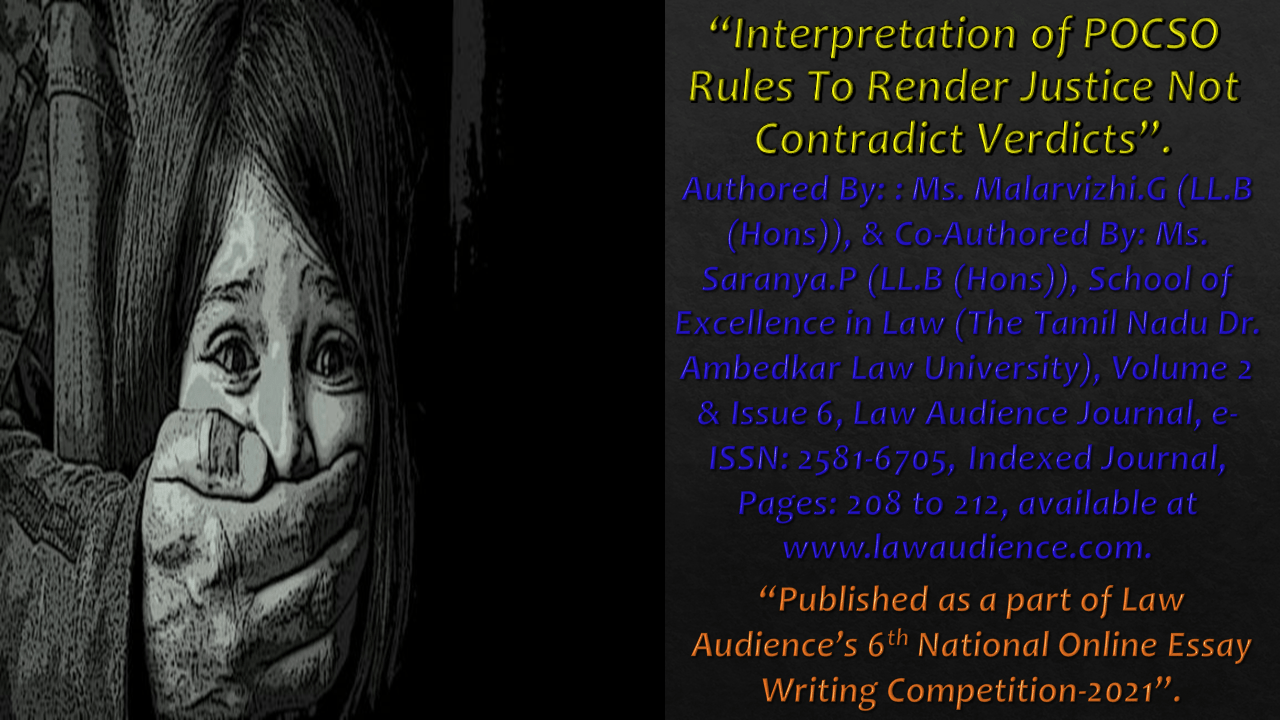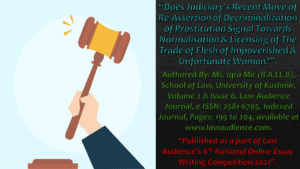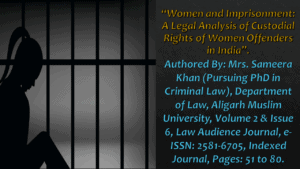Click here to download the full paper (PDF)
Authored By: Ms. Malarvizhi.G (LL.B (Hons)), & Co-Authored By:
Ms. Saranya.P (LL.B (Hons)), School of Excellence in Law (The Tamil Nadu Dr. Ambedkar Law University),
Click here for Copyright Policy.
ABSTRACT:
“The Protection of Children from Sexual Offences Act, 2012, addresses heinous crimes of sexual abuse and sexual exploitation of Children who are categorized under or below 18 years of age. In 2019, Amendment for this Act was executed with the intention to increase the punishment when compared before, as against for the person committing penetrating sexual assault below 16 years, in consequence of which will be punished with imprisonment extending up to 20 years to life-imprisonment or with fine or both, but it itself has failed in executing punishment by acquitting the accused whereby interpreting the provision of the statute in such a way to cause mental agony to the victim.
Though this POCSO Amendment Act, 2019 is a forward step taken by the Government to make the lives of the Children and their Rights to be protected, the lacunas of the Act as well as during the interpretation of such holds it back from achieving the real objectives of the Act. In recent times of interpreting this POCSO act by the Judges leads to huge criticism and controversy.
This paper aims to analyze;
- The Application for proper interpretation (i.e.) Narrow interpretation kills the soul of the POCSO Act, while rendering Judgment on this aspect.
- Global level aspect of interpreting sexual offences acts.
- Need for an activist role to be played by the Judges.”
I. INTRODUCTION:
The General criticism surrounding the Protection of Children from Sexual Offences Act, 2012 in recent times is that, the Statute is not being interpreted in strict manner in providing punishments to the accused for his heinous act; instead, it is interpreted in such a possible way to acquit the accused. Judgments in recent POCSO cases are questionable which reveals the lack of knowledge on the part of the judge while interpreting causing miscarriage to Justice.
II. NARROW INTERPRETATION KILLS THE SOUL OF POCSO ACT:
The Protection of Children from Sexual Offences Act is a Gender-Neutral Law enacted in 2012, with sole purpose to Protect and Safeguard Children from Sexual Predators. The Act also increased the scope of reporting Sexual Crimes against Children below the age of 18 years by expanding the definition of “Sexual Assault” to include “Non-Penetrative Sexual Assault” as well as “Aggravated Sexual Assault”. The POCSO Amendment Act, 2019 seeks to provide more stringent Punishment (i.e.) incorporating strong penal provisions like Death Penalty for Sexual Crimes against Children and also aimed to establish clarity regarding the Child Abuse and Punishment thereof.
Though the Act focused on improvising the Punishment for Sexual Offences against Children BY the Amendment made in 2019, one of the main problems sticks with interpreting the provisions of the statute. Hence, if the application of the Narrow Interpretation fails to achieve the object of the law then it must give way for Wider Construction paving way for an effective outcome based on the maxim Ut res magis valeat quam pereat.
For Instance,
- Recently two Controversial Decisions rendered by Justice Pushpa Virendra Ganediwala, additional judge in the Bombay High Court stunned many, whereby acquitting a 39-year-old-man from the charge under section 6 of the POCSO Act on the ground that pressing the breast of a 12-year-old-girl without removing her top did not entitle “SKIN TO SKIN CONTACT”. For which the court’s interpretation of the word “Physical contact” while defining Sexual Assault as “Direct Physical contact means Skin to Skin contact with Sexual Intent without Penetration”. The Judge was of the view that the sentence was too high and thus convicted under Section 354 of IPC (Offence of outraging the Women Modesty) and not under the POCSO Act[1].
- Subsequently, in the second controversial judgment she acquitted 50-year-old-man by ruling that “Holding the hand of a 5 years old-girl and unzipping his pant in her front” would not be categorized as a Sexual Offence under POCSO Act[2].
Therefore, this type of Narrow Interpretation allows a person to exploit the child without disrobing her and get away with lesser punishment though such person escapes from being penalized under the POCSO Act.
III. GLOBAL LEVEL ASPECT OF INTERPRETING SEXUAL OFFENCES ACTS:
When comparing Sexual Assault like POCSO, the law varies in countries across the globe. In, Scotland, the Sexual Offences Act, 2009 interprets that “Physical Contact” includes bodily contact or by means of an implement or through clothing. In California, the Child Abuse and Neglect Reporting Act, the interpretation is similar to UK and Scottish laws. In India, United Nation Convention on Rights of the Child and Legislations like Juvenile Justice (Care and Protection of Children) Act, 2015; POCSO Act, 2012; Prohibition of Child Marriage Act, 2006 etc., makes a commitment on Child Protection and also the National Plan of Action for Children (NPAC) 2016, the concept of Child Protection is one of the four priority areas in focus.
While looking at this likely interpretation of terms of what constitutes touching of physical contact in India to this regard POCSO Act could be interpreted by correcting it’s ambiguity including erroneous decisions which are traumatic for Child. When the statute is subjected to interpretation it is overshadowed with enhanced possibilities to overlook the spirit and true intention of the object of the law. So, it reflects how our society had failed to take collective action against these Sexual Offences and provide hindrance for our Children to flourish and thrive.
IV. NEED FOR AN ACTIVIST ROLE TO BE PLAYED BY THE JUDGES:
In Democratic countries, writing a Judgment entails the application of the law to a given set of facts. A Judge is assisted with their own quality of activism in rendering the justice. A question that requires to be considered is how the Judgments rendered by the High Court Judges in India which are meant to be the law declared for the entire state can be inaccurate and legally incorrect in their view of interpreting? The Judges should play an active role while interpretation the facts of the case with the object of law. They should not feel ambiguous or inconsistency in the active process of implementing such laws with the facts of the case. While doing so, Judges aims only in rendering justice to the victims and not acquitting the accused for the offence committed by him before the court of law. The power of interpretation used by the judges should not extend beyond causing ultra vires in forming a precedent. If the court interprets beyond ultra vires, it might be held unconstitutional, Thus activist who indulge themselves in interpreting must not contradict the main object or the true intention of the statute thereby causing consequences.
Even while dealing with an appeal, judges interfere with the findings of the trial court only if they are perverse or manifestly illegal. For Instance, the Interpretation of the statute ought to have led the judge to conclude that the act complained of was one of sexual assault, as per the meaning of Section 7 as under;
- In Satish vs. State of Maharashtra[3], the judge is ought to have been aware that the essential ingredients of Section 7 were met and hence, the judgment of the trial court ought not to have been reversed.
- In Libnus s/o Francis Kujur vs. State of Maharashtra[4], the offence committed under Section 7 may not have been committed, but clearly an attempt to commit such an offence was made with “Sexual Intent” and the judge should have noticed Section 18 of the Act, instead the sentence has been reduced to a conviction for Sexual Harassment, no reasons are given indicating any mitigating circumstances.
In the above judgments rendered under POCSO Act, the court has blatantly ignored the purpose of the statute while interpreting the term “Physical Contact” mentioned under Section 7 of the Act. Thus, when a court uses the power of interpretation, the provision of the act should be interpreted in consistent with the object of the statute in such a way that it does not contradict each other. Every Judge should exhibit an activist role when implementing the power of interpretation in the concerned cases.
V. CONCLUSION:
The Honorable Court appears to have disregarded the legislative history and object of the POCSO Act in making the provisions of the statute invalid to the cases of sexual harassment of a minor and applying the Indian Penal Code, 1860 instead (i.e.) when we talk about child abuse, there cannot be a more wrong interpretation or absurd interpretation of the law. So, the present legislation for Criminalizing sexual offences against Children was much needed piece of legislation and the process of Adjudication for the same should be made more transparent, that the people should sense the feel of contention and credibility in the whole process from the initiation to the adjudication.
For remedial approach, one can go for “Judicial Review” for the aggrieved decision. Normally, court does not interfere with the policy decision made by experts, but it would vary from case to case based on scope and extent of Judicial Review of Legislation.
Footnotes:
[1] Satish vs. State of Maharashtra, January 19,2021.
[2] Libnus s/o Francis Kujur vs. State of Maharashtra.
[3] Criminal Appeal No.161 of 2020, Coram: Pushpa V.Ganediwala,J., January 19,2021.
[4] Criminal Appeal No.445 of 2020, Coram: Pushpa V.Ganediwala,J., January 15,2021.
Cite this article as:
Ms. Malarvizhi.G & Ms. Saranya.P, Interpretation of POCSO Rules To Render Justice Not Contradict Verdicts, Vol.2 & Issue 6, Law Audience Journal, Pages 208 to 212 (29th June 2021), available at https://www.lawaudience.com/interpretation-of-pocso-rules-to-render-justice-not-contradict-verdicts/.



